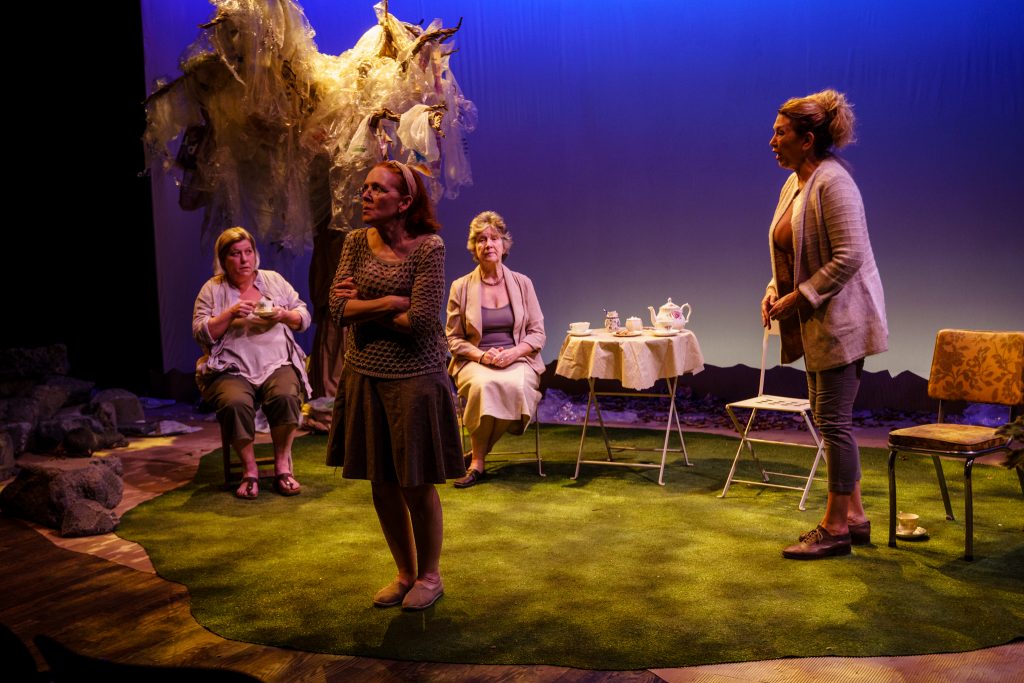
Set design: Glenn MacDonald. Lighting design: John Webber
Credit: Javier Sotres
At PAL Studio Theatre until November 17, 2019
Tickets from $20 at alone.brownpapertickets.com or 604-363-5734
Posted November 3, 2019
If you think of British playwright Caryl Churchill, Harold Pinter and Samuel Beckett you’ll come close to imagining Escaped Alone: gritty, funny, existential ponderings all wrapped up in fractured, free-range dialogue plus a bonus – one hilarious dance routine. Churchill, now in her early 80s, takes a look at the 21st century human condition in Escaped Alone which premiered in 2016 at London’s Royal Court and garnered a host of five-star reviews. Following the New York production in 2018, the New York Times declared Churchill “the most dazzlingly inventive living dramatist in the English language.” Not always a Churchill fan, I’d have to agree that she has really hit her stride: still provocative and still angry but now tempered with sympathy for her characters and the human condition. And still quirkily funny.
In Escaped Alone, the playwright gives us four characters – four women in their 70s. The apocalypse has begun: fires rage, floods are piling bloated bodies up against doorways, food is running out and, in lieu of eating, people are watching cooking shows on TV. Gas masks are available in a variety of colours but there’s a three month’s waiting list.
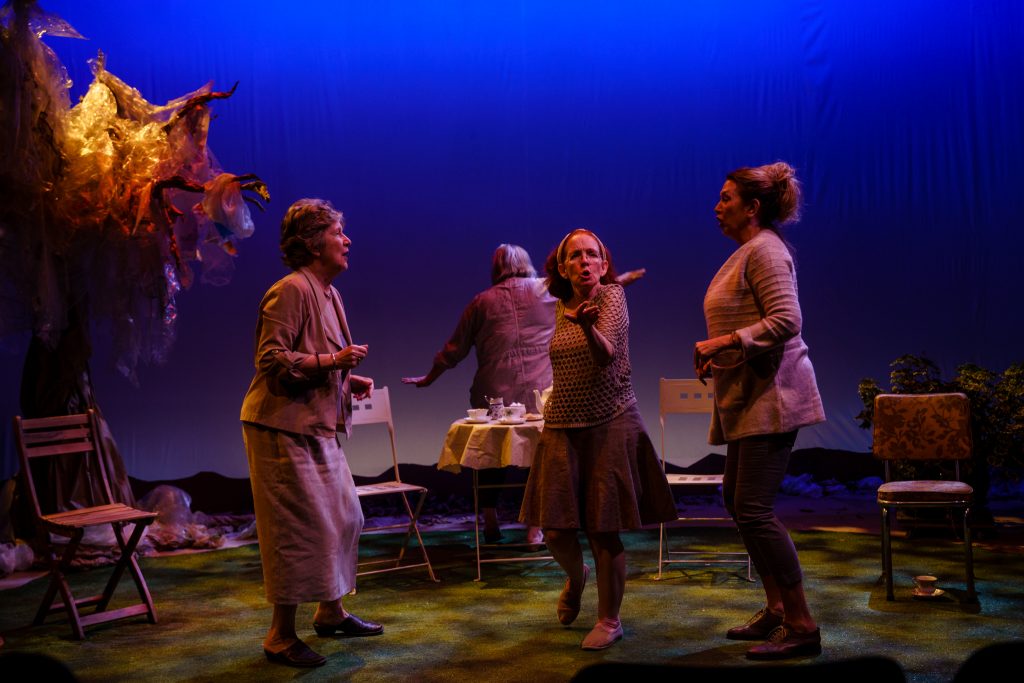
Credit: Javier Sotres
But these four women – Vi (Jenn Griffin), Lena (Anna Hagan), Sally (Eileen Barrett) and Mrs. J (Tanja Dixon-Warren) – are enjoying tea on their hostess’s sunlit patio; chaos is elsewhere, well outside her garden gate.
Glenn MacDonald provides an idyllic setting: a little table with a pretty bone china tea service, a grassy patch with four chairs and a huge blue sky as a backdrop. But the single tree, stage right, has no leaves and is thick with ragged, wind-ravaged plastic bags. The end of the world is underway while the women muse on the past: where the butcher shop or the café used to be, what birds they formerly saw (gannets, pigeons, cormorants and eagles), their nieces and nephews who may or may not still be alive; they don’t see them anymore.
Director Kathryn Bracht brings together four Vancouver actors who are at the top of their game and so capable of understanding and realizing Churchill’s script. Anna Hagan’s Lena is, of the four, upper-crusty in her pencil-slim skirt, well-coifed hair and sensible shoes. Lena is just on the edge of losing it, wishes she could be “invisible” and insists, when the others chide her, “I do get out. It’s just – difficult.” Frankly, she’s afraid to leave her house and garden.
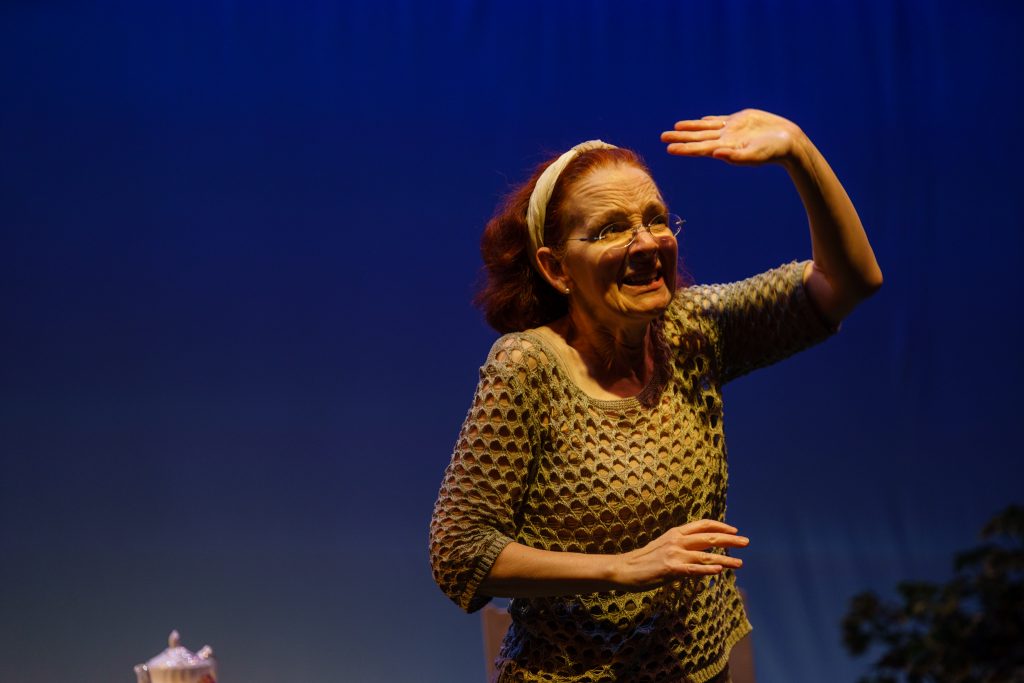
Credit: Javier Sotres
Sally, red-haired tied back, is nervous, high-strung and Eileen Barrett absolutely nails Sally’s long monologue – a breathtaking flight of terror over, of all things, cats. Sally imagines seeing them everywhere, even in teapots – and they terrify her. It’s both a real fear and a fantastic metaphor for the pervasive fear that underscores our lives: climate change, poisons on and in our foods, air quality, raging wildfires. While the monologue on one level is hilarious, with Barrett raking the air as she speaks, it’s also terrifyingly creepy.
There isn’t, per se, a plot but Jenn Griffin’s character Vi has just been sprung from a six-year stint in prison for the possible murder – possibly self-defence, possibly not – of her husband. Vi is wracked with confusion: did she or didn’t she? Griffin finds the perfect place between complacency and bewilderment. Vi is a bit dotty and more than a bit broken.
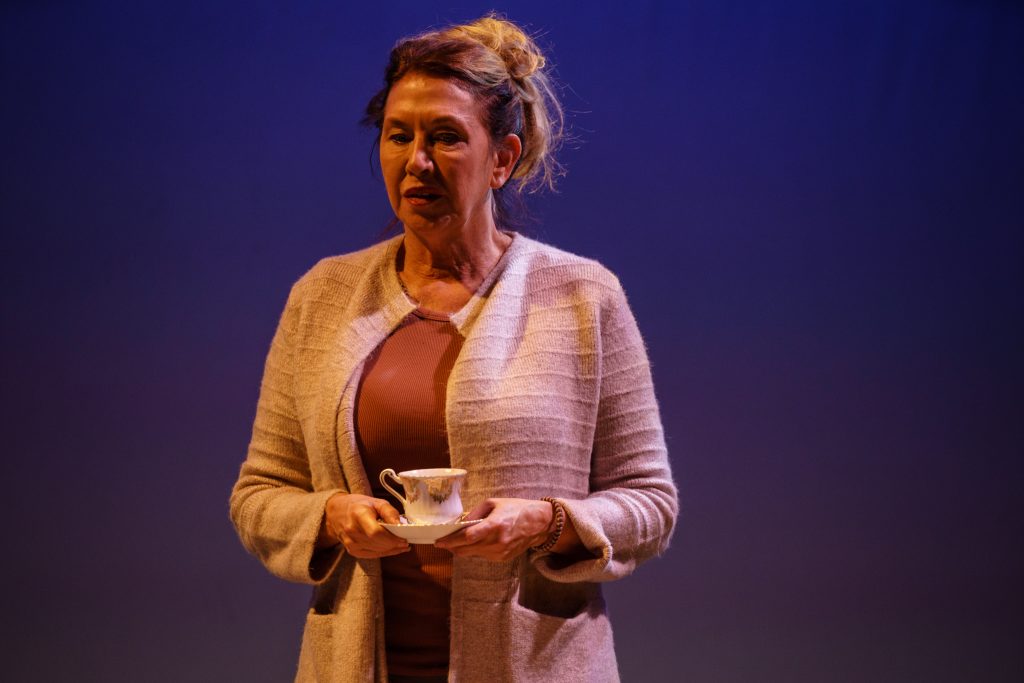
Credit: Javier Sotres
The most harrowing character is Mrs. J who was not actually invited to the tea party but, walking by, invites herself in. She comes in from the outside world into the insulated world of Vi, Sally and Lena. Mrs. J is less tone-y, less well-dressed, digs into the tea and cookies with gusto. But all of Churchill’s horrific images of dystopia are spoken through the otherwise casually chatty Mrs. J. Tanja Dixon-Warren steps out of the scene, throughout the play, and picked out in grey-white light delivers images of death and destruction: the bodies, the rats, stumps of burnt trees used for “art and biscuits”. Amazingly – and a credit to Dixon-Warren’s skill – the monologues are offered in such a straightforward manner, it is even more shocking. Dixon-Warren’s delivery is casual, matter-of-fact and there’s even a little half-smile as she wraps up each monologue. That the images are not devastating to Mrs. J attests to how accustomed we have become to bad news: refugee camps, windstorms, melting glaciers.
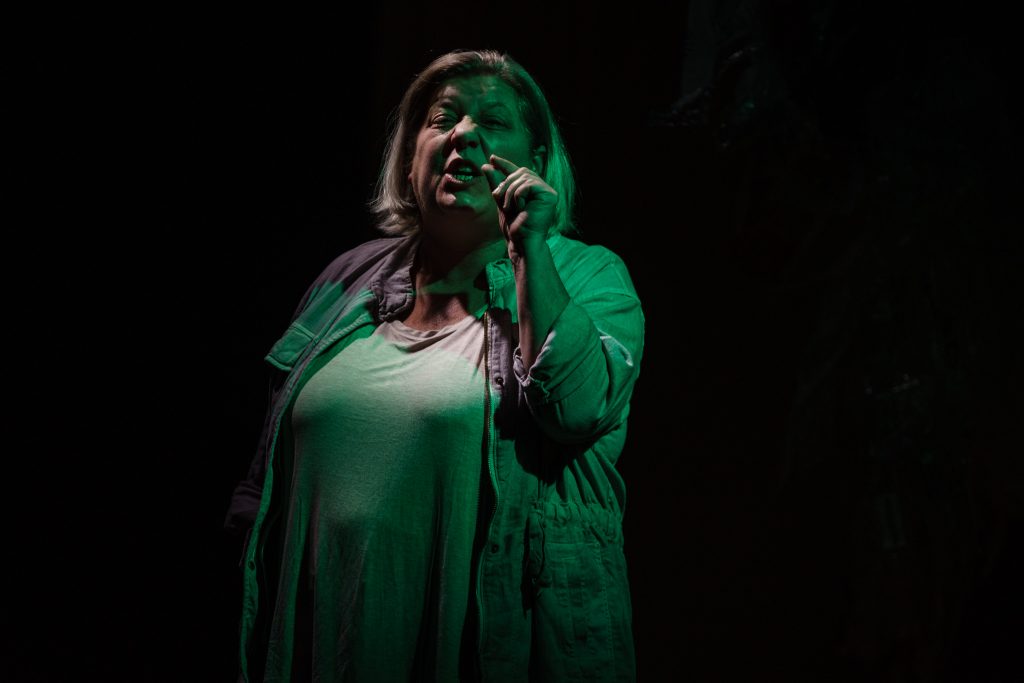
Credit: Javier Sotres
Mrs. J has one breakdown when she repeats, twenty-five times and with varying depths of passion, “Terrible rage, terrible rage . . . . . “ And then she steps back into the scene, picks up her tea, cookies and commences idle conversation.
This Western Gold Theatre production deserves, exactly as is, a main stage production. It’s the sort of play we used to see on the Vancouver Playhouse stage: important, relevant, poetic, intelligent, provocative, necessary. But you can see it now at PAL Studio Theatre now until November 17. Escaped Alone marks the first production for Western Gold Theatre under the artistic direction of Tanja Dixon-Warren. It bodes well for Western Gold and theatre-goers who are looking for more challenging – yet still entertaining – fare.

